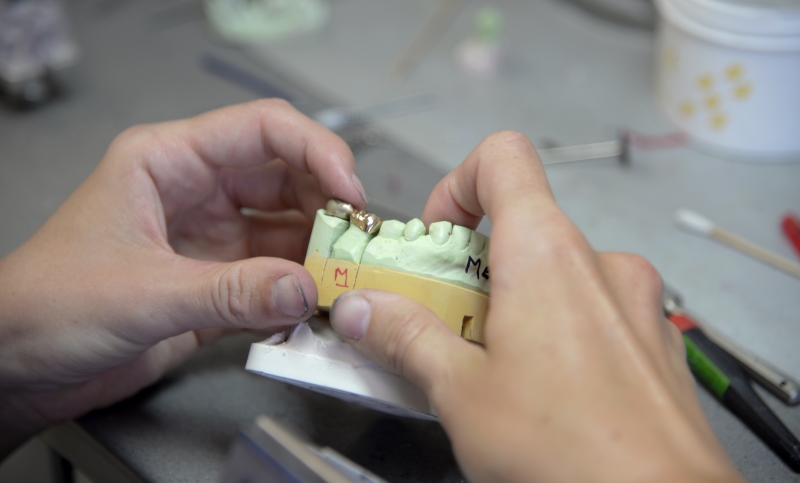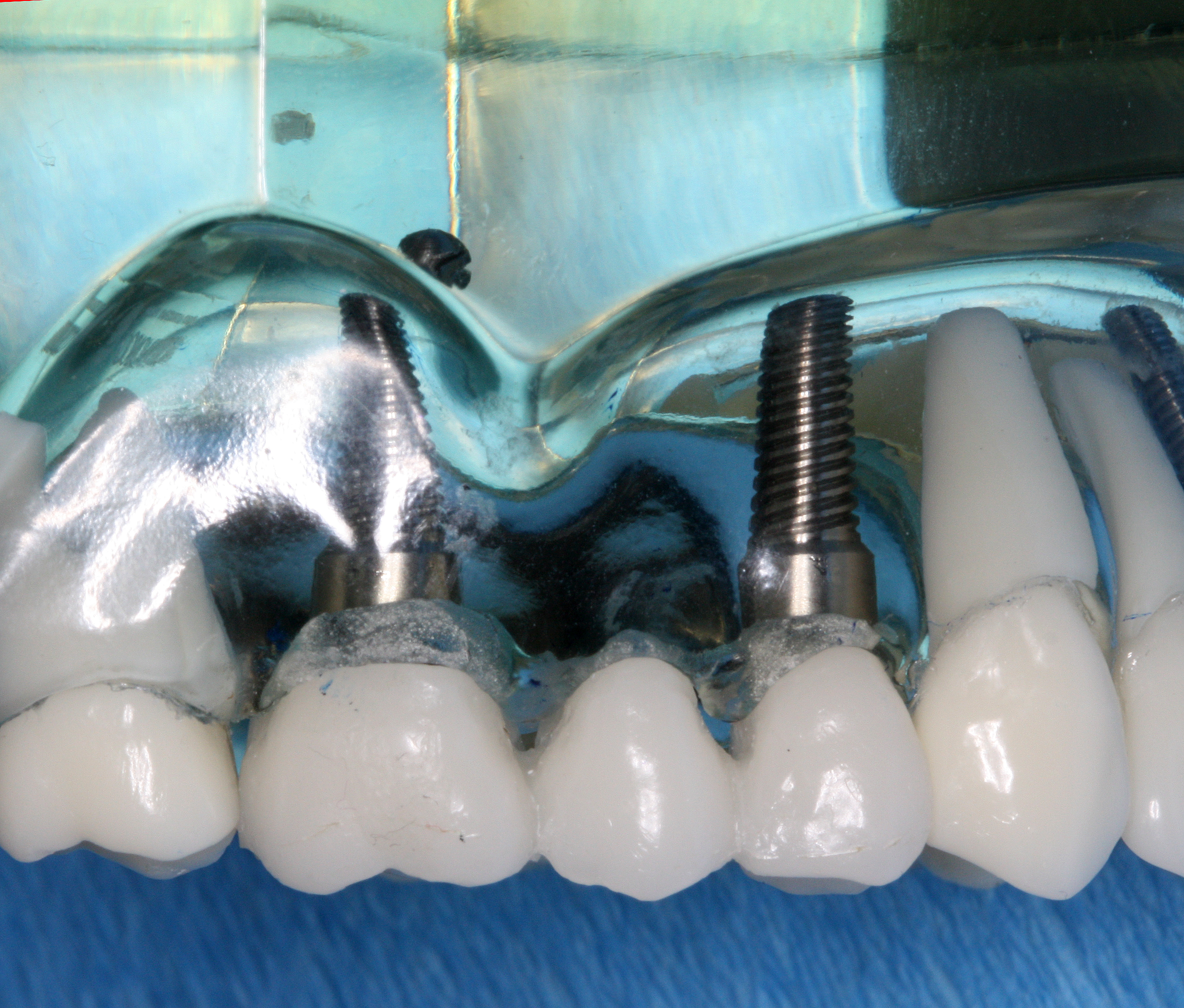There’s more to deciding between dental crowns vs. implants than just picking a personal preference, or what works with your budget. While both are effective solutions to restore a tooth, they are not really the same.
Understanding the different uses for dental crowns and dental implants could make the choice obvious. In situations where either one would work, there are pros and cons of each. Ultimately, a dentist can help you make the best choice.
How are Dental Crowns and Implants Different?
A dental crown is a cap that fits over the top of a tooth. A dental implant replaces the entire tooth. A titanium post replaces the root and a crown fits on top, with a metal knob called an abutment connecting the two.
The fact that a dental implant’s structure incorporates a crown is probably the reason why people tend to think of the two things as interchangeable. The crown portion of an implant is basically the same as a crown that is used by itself. They are both crafted from various materials to look and feel like real teeth. But while an implant’s crown attaches to a post and abutment, an ordinary dental crown fits onto the original tooth.
Solving the Right Problem
Often the reason for restoring a tooth will determine which is best between dental crowns vs. implants. They solve different problems.
Crowns

When decay has spread to the point where a filling would make up the majority of the tooth, the dentist might suggest a dental crown. After clearing out all of the decay from the cavity, the crown caps it off, sealing it against any further harm.
Bacteria can sometimes make its way all the way to the pulp chamber at the center of the tooth rather than just forming surface cavities. A root canal procedure might be necessary to fix it. During a root canal procedure, the dentist drills into the root to clear out the infected tissue, blood vessels, and nerves. The hole is filled and a crown is attached to the top.
A dentist may also use a crown to restore a cracked or chipped tooth.
Whether used by itself or as part of a root canal procedure, a dental crown needs to attach to a tooth. It depends on the patient having a tooth that is big enough and strong enough to support it. Dentists typically do all they can to save a tooth, but when the damage is too extensive, they may need to extract it.
Implants

A missing tooth doesn’t just spoil someone’s smile. The other teeth can move around and shift into the empty space. It can cause problems with eating and talking, too. Choices for fixing the problem include bridges, dentures, or implants. Dental implants have become increasingly popular because of their natural look and feel.
Implant surgery involves drilling a hole into the jaw at the site of the missing tooth. A titanium post and an abutment are placed there. It is finished off with a crown after some time is allowed for the jawbone to heal and grow around the post. In some cases, a bone graft might be necessary if the bone has trouble fusing to the post.
Getting a dental implant is a surgical procedure, so the patient needs to be in good health to consider it. And just as a crown needs a tooth to hold it, an implant’s success depends on the patient’s jaw. The jawbone must be strong enough to withstand the drilling and hold the post. That being said, the procedure has a success rate of about 97%, so it is a viable option for someone who would like a tooth restoration that looks realistic.
Dental Crowns vs. Implants: Speed and Recovery
Getting a dental crown is usually a two-part process. The dentist prepares the tooth at the first appointment and places a temporary crown on it. During the next week or two, using impressions of the patient’s original tooth, the permanent crown is created in a lab. At a second appointment, the dentist affixes the permanent crown into place. The patient is usually back to normal eating after a few days of minor discomfort when soft foods are suggested.
Dental implant surgery, partly because it is more invasive, takes longer. After drilling and placing the post, sufficient time must pass for the bone to fuse to the implant which can take weeks. If bone grafts are necessary, it may even be months. During that time, a temporary crown sits on top of the implant. Later, the permanent crown is attached.
There are some risks with implant surgery that don’t usually come with the placement of crowns. First of all, there’s a risk of infection with surgery of any kind. Also, implant drilling must be precise. Another tooth is hit, or the surgeon could accidentally nick a nerve or blood vessel, or even puncture the sinus cavity. Although these cases are rare, it is something to consider if there is a choice between dental crowns vs. implants.
Dental Crowns vs. Implants: Cost and Value

The cost of dental crowns depends on the material used. The most expensive is gold, followed by stainless steel, porcelain, ceramic, and finally resin, which is the cheapest. When getting a dental implant, the patient must consider the cost of the post and abutment too.
The cost of a crown ranges from approximately $800 to $1800 depending on what it’s made of and its size and location. The average price of a single tooth implant (post, abutment, and crown) is roughly $5,000.
In some cases, insurance may help pay for a crown or an implant. But in general, insurance companies view implants as cosmetic and won’t cover them. If a crown is part of a root canal procedure, it may have more of a chance for coverage. It is best to discuss any dental procedures with the dentist and the insurance company to find out how much might be an out-of-pocket cost.
It’s possible that a crown or an implant might need to be replaced at some point, but both offer a good value for the money. Back teeth typically see more wear and tear from chewing, so they will usually be the first to wear out. Crowns typically last from 5 to 15 years. Implants can last upwards of 25 years.
Recap: Which is Best? Dental Crowns vs. Implants?
Although some people think that crowns and implants are the same, they are actually used in two different ways.
Crowns are good for fixing a broken tooth or one damaged by decay, as long as the tooth is still mostly intact. Crowns are cheaper than implants and the procedure is quicker and less invasive.
Implants are a nearly permanent solution to missing teeth. Although pricey, they can last 25 years or more as the jawbone is strong enough to support them. They look and feel just like a patient’s original teeth.A dentist is the best person to consult about whether a crown or an implant is the best choice for you. Click here and we’ll start the process of finding you a dentist in your area who can help.


